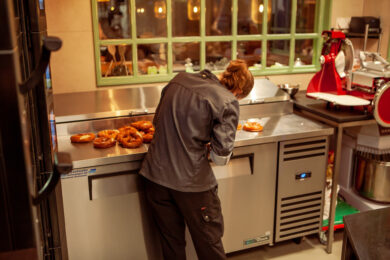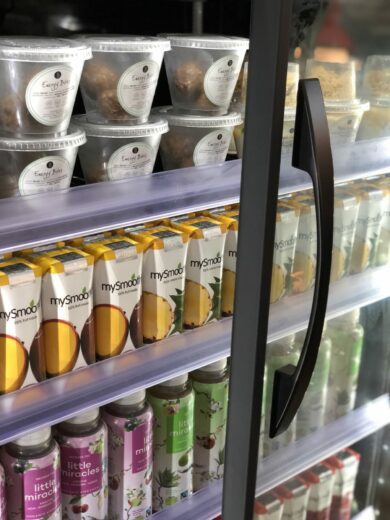The HFC regulations are in place. The phase-out deadlines are upon us. Now is the time to assess your refrigeration assets and determine the impact on your operation.
But is your business prepared?
The industry is moving towards more sustainable forms of cooling, a mandated change heavily driven by initiatives like Energy Labelling and the F-Gas Regulation. The goals are to significantly reduce energy waste and Global Warming emissions caused by Fluorinated greenhouse gases (F gases).
The most harmful F gases (those with the highest Global Warming Potential) are being phased out first, but all F gases will need to be replaced soon, so it is imperative that operators fully understand what equipment is currently in their estate, and the impact these changes will have on their business. We call this preparation your “HFC Exit Plan” and every operator should have one.
Why do I need an HFC Regulation Exit Plan?
Chances are if you own any integral freezer cabinets or larger refrigerators which are more than a couple of years old, then you have equipment that operates on R404A gas. Due to it’s high GWP, the sale of new equipment using R404A gas was banned from 1 January 2020, and additional restrictions brought in around the servicing and maintenance of existing equipment, placing legal responsibilities on the operator with regard to limiting harmful gas leakage.
The 2020 changes also further limit gas production/availability as part of the phase-out plan, resulting in rising costs which could have a significant impact on the cost of service work for operators with older units that are out of warranty.
The direction is clear. This older refrigeration equipment is becoming less viable, and operators are being incentivized to move over to newer, more sustainable, and environmentally-friendly alternatives.
Creating your HFC exit plan starts by taking stock of your existing refrigeration inventory. By identifying older models and determining their ongoing costs (energy, maintenance, repair, etc) you may find that replacing some or all with new units, benefitting from advancements in improved energy efficiency and warranty coverage can save money. New products operating on Hydrocarbon (HC) refrigerants can also significantly contribute towards achieving your environmental responsibility and sustainability goals.

How can I plan?
Regardless of regulation, undertaking regular audits and keeping an up to date record of the refrigeration equipment in your estate is simply good practice. With accurate data, you can effectively determine the point at which equipment replacement makes sense.
Start by identifying your assets and compiling their information. Note down the manufacturer, model name, serial and asset numbers, refrigerant gas used, the age of the equipment, and its warranty coverage status.
It is possible to compare the energy usage of equipment, old-for-new, based on product labeling published on manufacturer and distributor websites.
For existing older products, labeling (introduced 2016) may not exist, so it may be necessary to contact the manufacturer directly for information. In the case of discontinued products, it is safe to assume that an HC equivalent product available today will be at least 30% more energy efficient but could be several hundred times more efficient.
True Hint: You can determine the running costs of equipment by multiplying the kWh/annum number stated on the label by the price they pay per KWh for electricity.
Once you’ve collated the information, you should be able to identify assets that would benefit from replacement immediately or in the coming periods. To avoid the added costs and legal obligations of F-Gas, and receive the benefits of HC refrigeration technology, True always recommends that any existing assets operating on HFC gases which are out of warranty, in poor condition, and/or 5+ years old should be considered for replacement.
For operators with large estates, using the most energy-efficient products available can have a huge impact on utility costs. It’s not just about the acquisition cost of the equipment, but the operating costs over the lifetime of the product, which can equate to several times the capital cost of the product purchase.

Our Top Tips
- If you own anything older than 5 years old that’s in poor condition, replace the model. It’ll cost you less in repairs and will be much more energy-efficient.
- Write down the details of your units, including model, serial numbers, warranty info, and the gas used.
- Take regular audits of your assets and keep your information up to date.
- Talk to your refrigeration manufacturer about your F-gas concerns. They’ll be happy to help.
How can True help?
True is committed to being part of a more sustainable future.
Our Natural Refrigeration development initiative has seen the redevelopment of our entire product offering, and this year, we will complete the transition to 100% HC.
As a result of this investment, True now produce several of the most energy-efficient commercial refrigeration products currently available on the market. Helping operators to be more environmentally responsible, achieve targets to reduce energy consumption, save money, and supply them with a better, more reliable refrigeration product.

As well as manufacturing sustainable products, we have also launched an awareness campaign, Be Ready. The campaign intends to educate operators on new legislation, as well as the impact of refrigeration on businesses as relates to sustainability and the environment.
True is dedicated to helping operators choose sustainable refrigeration equipment.
We all have a responsibility in the fight against global warming. Are you ready?
Talk to us about your sustainability questions and let us help you draft an HFC regulation-friendly plan today.








